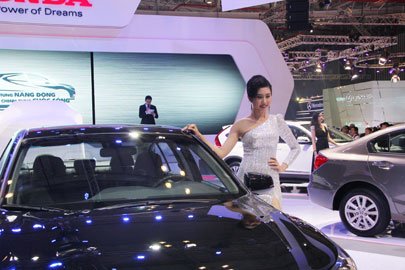|
Despite
calls for a rethink of a controversial automotive industry development plan,
the Government of

A model poses next to a
car on display at an auto exhibition in this file photo. The Ministry of
Finance is drafting a law designed to provide a slew of new tax incentives
for operational and new auto projects
The Ministry of
Finance is drafting a law designed to provide a slew of new tax incentives
for operational and new auto projects in a fresh bid to develop the auto
industry into a strong one.
Under the draft
law which amends some provisions in a range of laws on taxes, auto
enterprises could enjoy a corporate income tax rate of 10% for 15 years plus
a tax exemption in the first four years and a tax reduction of 50% in nine
following years.
The tax incentives
would go to manufacturers of priority cars if they meet requirements for
capital, employment and capital disbursement as well as new projects which
produce key parts like engines and gearboxes.
The ministry
explained such revisions aim to ensure the incentives for enterprises in the
industry will be in line with the Investment Law and
On July 18, the
Government office said the PM assigned the Ministry of Finance to coordinate
with the Ministry of Industry and Trade and relevant agencies to revise
special consumption and corporation income tax policies for auto projects and
pass them to the National Assembly at the tenth session.
As for special
consumption tax, low rates would be applied to priority cars but high rates
would be imposed on cars that are fuel-consuming, of large size, have engine
capacity of over three liters and high levels of emissions.
According to the
Ministry of Finance, import tariffs on autos from ASEAN countries will be
lowered to 0-5% in 2018 and tariffs on auto parts imported from
To encourage the
use of fuel-efficient cars, ASEAN countries will levy low special consumption
tax rates on autos with small engine capacities and those using clean energy.
The average tax is 15-30% for autos with engine capacity of two liters but
the tax is very high for those with engine capacity of over three liters such
as 125% in
As per the Prime
Minister’s instruction and tax rates in ASEAN countries, the finance ministry
said special consumption tax amendments and corporate income tax incentives
are urgent to back the development of the auto industry.
According to the
ministry,
The draft law
amends and supplements seven laws on taxes, including corporate income tax,
personal income tax, value-added tax, special consumption tax, tax on use of
non-agricultural land, environmental protection tax and tax management.
SGT
|
Chủ Nhật, 30 tháng 8, 2015
Đăng ký:
Đăng Nhận xét (Atom)
Không có nhận xét nào:
Đăng nhận xét